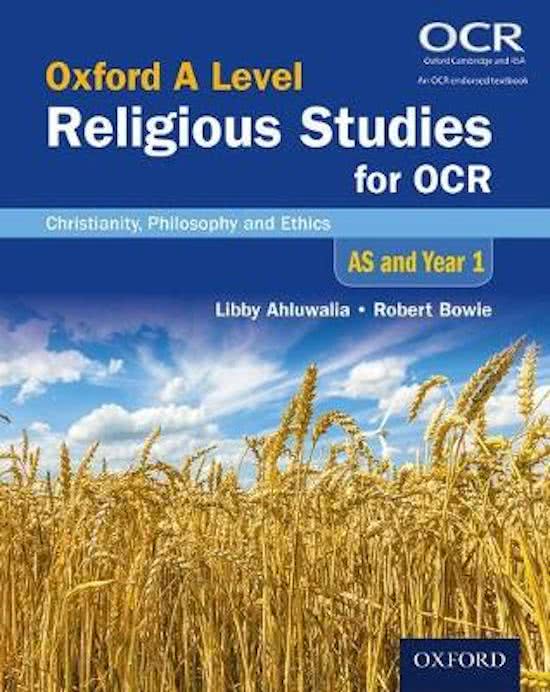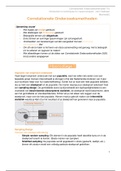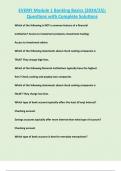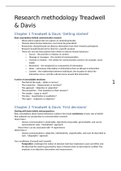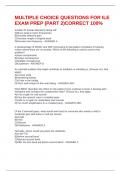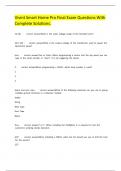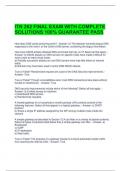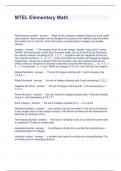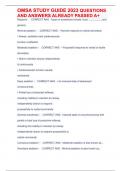NATURAL MORAL LAW (2.1) Key ethical terms to describe this theory: Deontological, synderesis, absoluteness & relativeness
Section and trigger What is being argued?
terms
Aquinas’ natural moral law theory including:
Telos - origins of the significant Aquinas develops a number of his ideas from his reading of Aristotle. Aristotle believed that the universe and everything within it had a telos, a pu
concept of telos in Aristotle telos is the final cause. This is easy for us to accept when it comes to everyday objects – for example, the material cause of the chair is ‘wood’ and
and its religious development far as Aristotle is concerned, humans, and even actions, have a telos.
in the
writing of Aquinas Aristotle sees the telos of human beings as Eudaimonia. This is a notoriously difficult word to translate into English. Its main meaning
is happiness but not in the sense of pleasure but rather fulfilment and human flourishing. Hence revision for an exam does lead to happiness in th
requires a full human life where we not only experience pleasure, but we also participate in society and develop academically as philosophers. Th
Aquinas draws several key lessons from these ancient thinkers in producing his own theory of Natural Law:
Telos – the idea that humans have a purpose or end.
Reason – the world is ordered and rational, we have the capacity given by God to understand it.
Nature – we have a human nature and it is important to do what is ‘natural’, i.e. what fits with our nature. .
The four tiers of 1. Eternal Law: the principles by which God made and controls the universe and which are only fully known to God
Law - what they are and how The Eternal Law is the law as known in the mind of God. In simple terms, it is his knowledge of what is right and wrong. These are moral
they are related: truths that we at a human level may be unable to fathom. However, God has given us the ability to reason so we may be able imperfectly to work
2. Divine Law: the law of God revealed in the Bible, particularly in the Ten Commandments and the Sermon on the Mount
The Divine Law refers to the law revealed by God through the commands and teachings through revelation, for example in scripture.
These include the Ten Commandments and the moral teachings of Jesus in the Sermon on the Mount. It may seem slightly unusual that Aquinas r
than revealed. However, he believes that these laws revealed by God are reasonable; we could work them out.
3. Natural Law: the moral law of God within human nature that is discoverable through the use of reason
Natural Law is the moral thinking that we are all able to do whether or not we have had the divine revelation of scripture. All humans have the ca
our purpose. This involves a rational reflection on our human nature and considering how we might ‘do good and avoid evil’.
4. Human Law: the laws of nations
Human Laws are the customs and practices of a society. They are devised by governments and by societies. Ideally, it should be based on what we
are based on Divine and Natural Law. To break a Human Law that was not based on Divine or Natural Law would be illegal but would not be immo
Precepts - what they are and The key precept (do good, avoid evil)
how they are related The main moral rule or precept according to Aquinas is that we should ‘do good and avoid evil’. This is known as the synderesis rule. All other
moral rules are taken from this.
The five primary precepts (preservation of life, ordering of society, worship of God, education of children, reproduction)
Aquinas believed that, when we reflect on our telos and understand the synderesis rule, there are five primary precepts or rules that emerge:
, The secondary precepts:
The primary precepts are not that specific; they are general statements about what is good for humans. Secondary precepts are more specific rule
that preservation of life is a primary precept we can deduce that killing a fellow human is wrong. Whereas the primary precepts are fixed, there is
the primary precepts apply in specific circumstances.
While Catholic interpreters of Aquinas have made quite fixed secondary precepts – for example, a rejection of contraception given that the
primary precept is reproduction – Aquinas himself never goes this far. For Aquinas, the secondary precepts are possible applications rather than h
Wider Reading:
Fitzpatrick – Doctrine of Double effect case study: For example, in Tactical Bombing, a pilot carries out a targeted strike on a densely populated
village as a means to sow terror and demoralize the enemy, hastening a favourable end to the war. The DDE implies that at least sometimes, in
cases like this, the latter action can be permissible as the harm to civilians is merely a foreseen but unintended side-effect in Tactical Bombing.
However, simultaneously - many have attacked the DDE on the grounds that the distinction between intended effects and merely
foreseen but unintended side-effects is so vague and arbitrary that virtually any case of what intuitively seems to be intended harm can be recast
as a case of merely foreseen, unintended harm, rendering the distinction morally useless: if it can be used to justify anything then it can be so
abused to justify virtually everything. Consider the Tactical Bomber again. What stops him from appealing to the double effect distinction himself
as he drops his bombs on a major population centre (Bennett 1981, 1995)?
Naturalistic Fallacy – G.E Moore argues that Aquinas, and other versions of Natural Law, commit the naturalistic fallacy – moving from an
analysis of how thing are to claims about how they should be. The way things are is not necessarily a good guide to the way they should be
-"Something is natural; therefore, it is morally acceptable," or "This property is unnatural; therefore, this property is undesirable." Such
inferences are common in discussions of medicine, homosexuality, environmentalism, and veganism. The same could be said for Aquinas’ primary
precept of reproduction - since homosexuals cannot reproduce, does this make their entire life immoral? Or, since sex is mainly for reproduction,
does this make sex for pleasure immoral and a depraved act?
Vardy and Vardy – ‘baptized reason’ – Catholic Natural Law has been criticised for accommodating pillars of doctrine, such as priestly celibacy,
which otherwise seem inconsistent with the principles of Natural Law – this has led to it being referred to as ‘baptised reason’. As a result of this,
it creates a contradiction of rules and absolutist elements of Natural Law, which many people struggle to accept the harsh and inflexible rules that
have been derived from it.
Coffey and Brown – Utilitarian’s believe they can weigh basic goods against one another on the scales of pleasure and pain. In Natural Law,
morality seems far rooted in self-evident natural principles, and its aversion to making moral decisions based on consequences. Contrastingly,
Utilitarian’s are far happier to weigh conflicting goods on the scales of pleasure and pain to achieve the best outcome. This angle leads to ‘what
should I do in this dilemma?’ rather than ‘how do I pursue a flourishing and worthwhile life?’ NML and its deontology fails against Utilitarian’s
, SITUATION ETHICS (2.2) Key ethical terms to describe this theory: Relative, Deontological, Agape,
Agape - origins of agape in the New Testament and its
religious development in the writing of Fletcher
NEW TESTAMENT
THE SIX PROPOSITIONS - what they are and how they give rise to the theory of situation ethics and its a
1.Love is the only thing 2. Love is the ruling norm 3. Love and justice 4. Love wills the neighbour’s 5. Love is the goal or end of 6.
that is intrinsically in ethical decision making are the same good regardless of whether the the act and that justifies w
and replaces all laws thing–justice is love neighbour is liked or not any means to achieve that
that is distributed goal
There is one thing which Agape is an attitude and For Fletcher, Agape is in the business of In direct rejection of the Et
is intrinsically good, that not a feeling at all, one practically all moral loving the unlovable. deontological approaches gr
is good irrespective of which does not expect problems we Fletcher says that any Fl
context, namely love. If anything in return and encounter can be action we take, as m
love is what is good, does not give any special boiled down to an considered as an action sh
then an action is right or considerations to anyone. apparent tension independent of its st
wrong in as far as it Agape regards the enemy between “justice” consequences is literally, w
brings about the most in the same way as the on the one hand “meaningless and ac
amount of love. friend, brother, spouse, and “love” on the pointless”. An action, such be
lover. Given our modern other. as telling the truth, only br
context and how people acquires its status as a
typically talk of “love” it is means by virtue of an end
probably unhelpful to beyond itself.
even call it “love”.
THE FOUR WORKING PRINCIPLES - what they are and how they are intended t
1.pragmatism: it is based on experience rather 2. relativism: it is based on making the 3. positivism: it begins with belie
than on theory absolute laws of Christian ethics relative and importance of love
Section and trigger What is being argued?
terms
Aquinas’ natural moral law theory including:
Telos - origins of the significant Aquinas develops a number of his ideas from his reading of Aristotle. Aristotle believed that the universe and everything within it had a telos, a pu
concept of telos in Aristotle telos is the final cause. This is easy for us to accept when it comes to everyday objects – for example, the material cause of the chair is ‘wood’ and
and its religious development far as Aristotle is concerned, humans, and even actions, have a telos.
in the
writing of Aquinas Aristotle sees the telos of human beings as Eudaimonia. This is a notoriously difficult word to translate into English. Its main meaning
is happiness but not in the sense of pleasure but rather fulfilment and human flourishing. Hence revision for an exam does lead to happiness in th
requires a full human life where we not only experience pleasure, but we also participate in society and develop academically as philosophers. Th
Aquinas draws several key lessons from these ancient thinkers in producing his own theory of Natural Law:
Telos – the idea that humans have a purpose or end.
Reason – the world is ordered and rational, we have the capacity given by God to understand it.
Nature – we have a human nature and it is important to do what is ‘natural’, i.e. what fits with our nature. .
The four tiers of 1. Eternal Law: the principles by which God made and controls the universe and which are only fully known to God
Law - what they are and how The Eternal Law is the law as known in the mind of God. In simple terms, it is his knowledge of what is right and wrong. These are moral
they are related: truths that we at a human level may be unable to fathom. However, God has given us the ability to reason so we may be able imperfectly to work
2. Divine Law: the law of God revealed in the Bible, particularly in the Ten Commandments and the Sermon on the Mount
The Divine Law refers to the law revealed by God through the commands and teachings through revelation, for example in scripture.
These include the Ten Commandments and the moral teachings of Jesus in the Sermon on the Mount. It may seem slightly unusual that Aquinas r
than revealed. However, he believes that these laws revealed by God are reasonable; we could work them out.
3. Natural Law: the moral law of God within human nature that is discoverable through the use of reason
Natural Law is the moral thinking that we are all able to do whether or not we have had the divine revelation of scripture. All humans have the ca
our purpose. This involves a rational reflection on our human nature and considering how we might ‘do good and avoid evil’.
4. Human Law: the laws of nations
Human Laws are the customs and practices of a society. They are devised by governments and by societies. Ideally, it should be based on what we
are based on Divine and Natural Law. To break a Human Law that was not based on Divine or Natural Law would be illegal but would not be immo
Precepts - what they are and The key precept (do good, avoid evil)
how they are related The main moral rule or precept according to Aquinas is that we should ‘do good and avoid evil’. This is known as the synderesis rule. All other
moral rules are taken from this.
The five primary precepts (preservation of life, ordering of society, worship of God, education of children, reproduction)
Aquinas believed that, when we reflect on our telos and understand the synderesis rule, there are five primary precepts or rules that emerge:
, The secondary precepts:
The primary precepts are not that specific; they are general statements about what is good for humans. Secondary precepts are more specific rule
that preservation of life is a primary precept we can deduce that killing a fellow human is wrong. Whereas the primary precepts are fixed, there is
the primary precepts apply in specific circumstances.
While Catholic interpreters of Aquinas have made quite fixed secondary precepts – for example, a rejection of contraception given that the
primary precept is reproduction – Aquinas himself never goes this far. For Aquinas, the secondary precepts are possible applications rather than h
Wider Reading:
Fitzpatrick – Doctrine of Double effect case study: For example, in Tactical Bombing, a pilot carries out a targeted strike on a densely populated
village as a means to sow terror and demoralize the enemy, hastening a favourable end to the war. The DDE implies that at least sometimes, in
cases like this, the latter action can be permissible as the harm to civilians is merely a foreseen but unintended side-effect in Tactical Bombing.
However, simultaneously - many have attacked the DDE on the grounds that the distinction between intended effects and merely
foreseen but unintended side-effects is so vague and arbitrary that virtually any case of what intuitively seems to be intended harm can be recast
as a case of merely foreseen, unintended harm, rendering the distinction morally useless: if it can be used to justify anything then it can be so
abused to justify virtually everything. Consider the Tactical Bomber again. What stops him from appealing to the double effect distinction himself
as he drops his bombs on a major population centre (Bennett 1981, 1995)?
Naturalistic Fallacy – G.E Moore argues that Aquinas, and other versions of Natural Law, commit the naturalistic fallacy – moving from an
analysis of how thing are to claims about how they should be. The way things are is not necessarily a good guide to the way they should be
-"Something is natural; therefore, it is morally acceptable," or "This property is unnatural; therefore, this property is undesirable." Such
inferences are common in discussions of medicine, homosexuality, environmentalism, and veganism. The same could be said for Aquinas’ primary
precept of reproduction - since homosexuals cannot reproduce, does this make their entire life immoral? Or, since sex is mainly for reproduction,
does this make sex for pleasure immoral and a depraved act?
Vardy and Vardy – ‘baptized reason’ – Catholic Natural Law has been criticised for accommodating pillars of doctrine, such as priestly celibacy,
which otherwise seem inconsistent with the principles of Natural Law – this has led to it being referred to as ‘baptised reason’. As a result of this,
it creates a contradiction of rules and absolutist elements of Natural Law, which many people struggle to accept the harsh and inflexible rules that
have been derived from it.
Coffey and Brown – Utilitarian’s believe they can weigh basic goods against one another on the scales of pleasure and pain. In Natural Law,
morality seems far rooted in self-evident natural principles, and its aversion to making moral decisions based on consequences. Contrastingly,
Utilitarian’s are far happier to weigh conflicting goods on the scales of pleasure and pain to achieve the best outcome. This angle leads to ‘what
should I do in this dilemma?’ rather than ‘how do I pursue a flourishing and worthwhile life?’ NML and its deontology fails against Utilitarian’s
, SITUATION ETHICS (2.2) Key ethical terms to describe this theory: Relative, Deontological, Agape,
Agape - origins of agape in the New Testament and its
religious development in the writing of Fletcher
NEW TESTAMENT
THE SIX PROPOSITIONS - what they are and how they give rise to the theory of situation ethics and its a
1.Love is the only thing 2. Love is the ruling norm 3. Love and justice 4. Love wills the neighbour’s 5. Love is the goal or end of 6.
that is intrinsically in ethical decision making are the same good regardless of whether the the act and that justifies w
and replaces all laws thing–justice is love neighbour is liked or not any means to achieve that
that is distributed goal
There is one thing which Agape is an attitude and For Fletcher, Agape is in the business of In direct rejection of the Et
is intrinsically good, that not a feeling at all, one practically all moral loving the unlovable. deontological approaches gr
is good irrespective of which does not expect problems we Fletcher says that any Fl
context, namely love. If anything in return and encounter can be action we take, as m
love is what is good, does not give any special boiled down to an considered as an action sh
then an action is right or considerations to anyone. apparent tension independent of its st
wrong in as far as it Agape regards the enemy between “justice” consequences is literally, w
brings about the most in the same way as the on the one hand “meaningless and ac
amount of love. friend, brother, spouse, and “love” on the pointless”. An action, such be
lover. Given our modern other. as telling the truth, only br
context and how people acquires its status as a
typically talk of “love” it is means by virtue of an end
probably unhelpful to beyond itself.
even call it “love”.
THE FOUR WORKING PRINCIPLES - what they are and how they are intended t
1.pragmatism: it is based on experience rather 2. relativism: it is based on making the 3. positivism: it begins with belie
than on theory absolute laws of Christian ethics relative and importance of love

